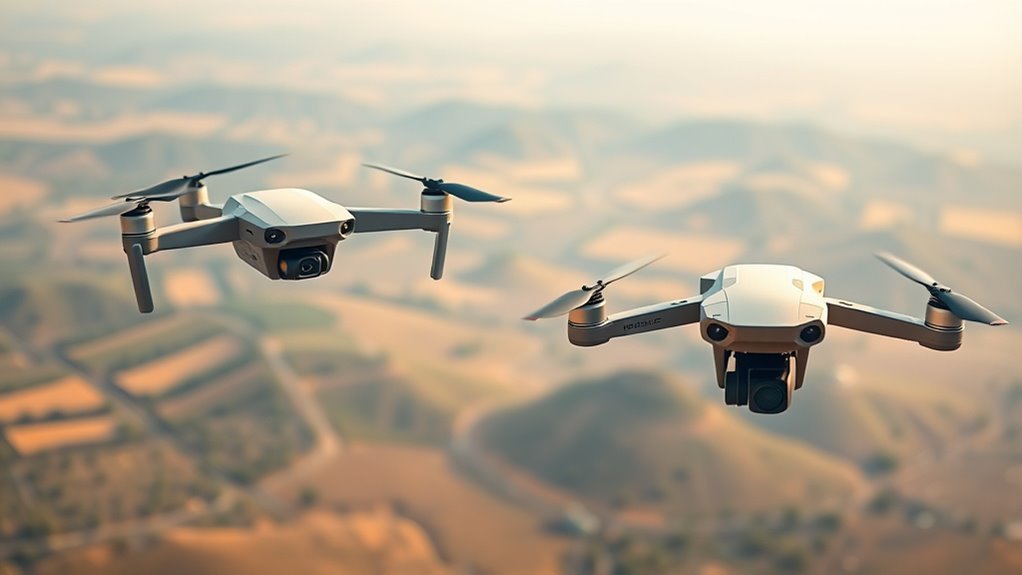You’ll find the DJI Mini 3’s lightweight build, under 250g, perfect for easy portability and a solid 10km OcuSync 3 range, ideal for quick adventures. Meanwhile, the Autel EVO II Pro V3 boasts a longer 12km SkyLink range and 6K video, delivering superior clarity for professional shoots. It’s all about your priorities: mobility or power. Detailed comparisons ahead reveal more key differences.
Design and Portability Comparison
While the DJI Mini 3 prioritizes ultra-lightweight design for effortless portability, the Autel EVO II Pro V3 focuses on robust build quality, which impacts its overall carry ease. You’ll notice the weight comparison reveals the DJI at under 250 grams, letting you slip it into a backpack for spontaneous adventures without hassle, while the Autel tips the scales at around 1,000 grams, demanding a sturdier case but offering durability for rugged explorations. This difference influences your freedom to roam, as the DJI’s featherlight frame enhances mobility for quick setups in remote areas. Regarding ergonomic design, the DJI features a compact, intuitive grip that fits comfortably in your hand, reducing fatigue during extended use, whereas the Autel’s bulkier form provides better stability but requires more effort to maneuver. Ultimately, you can choose based on whether you prioritize agile, unobtrusive flights or a resilient build that withstands the elements, empowering your aerial pursuits. Additionally, the DJI Mavic 3 Pro’s compact design also highlights the trend towards portability in modern drone engineering.
Transmission Range and Performance
When evaluating transmission range and performance, the DJI Mini 3 delivers up to 10 km with its OcuSync 3 system, while the Autel EVO II Pro V3 offers a comparable 9 km range via its SkyLink technology. You’ll appreciate how these options enhance your aerial freedom, allowing you to explore further without constant worries about losing connection.
In terms of transmission technology, OcuSync 3 from DJI uses advanced auto-switching between frequencies for better adaptability, whereas Autel’s SkyLink employs a robust multi-band approach for similar reliability. Both prioritize signal stability, but DJI’s system often excels in urban environments with less interference, giving you smoother flights in crowded areas. Autel counters with stronger performance in open spaces, where its technology maintains stable links over varied terrains.
Analytically, if you seek dependable signal stability for adventurous outings, DJI might edge out due to its proven track record, though Autel’s offering guarantees you’re not overly restricted by potential obstacles. This balance lets you choose based on your specific freedom-seeking needs. Additionally, both systems emphasize signal stability as a critical feature, enhancing overall flight experiences. (149 words)
Video Quality and Features Analysis
The DJI Mini 3 captures video at up to 4K resolution with a 1/1.7-inch sensor, while the Autel EVO II Pro V3 steps up to 6K footage via its larger 1-inch sensor, offering you sharper details and better low-light performance. When evaluating video resolution, you’ll appreciate the Autel’s 6K capability for enhanced clarity in your aerial adventures, allowing greater post-production flexibility without compromising freedom in the skies. In contrast, DJI’s 4K strikes a balance for lightweight portability, ideal if you’re seeking unobstructed flights.
For color accuracy, the Autel’s sensor excels in rendering vibrant, true-to-life hues, particularly in challenging conditions, giving you more reliable results for professional edits. DJI holds its own with consistent color profiles, though it may not match Autel’s depth. Ultimately, your choice depends on prioritizing resolution for detail versus balanced features that support spontaneous, liberated exploration. Both empower your creative vision, but Autel’s edge in video resolution and color accuracy could elevate your footage’s impact. Additionally, the integration of advanced lens technology enhances light transmission, contributing to the overall quality of the captured video.
Frequently Asked Questions
How Much Does the DJI Mini 3 Cost?
You’re asking about the cost of the DJI Mini 3, a popular drone for those seeking aerial freedom. It’s available in various pricing options, starting around $549 for the basic model, with bundles reaching up to $799 or more, depending on features like extra batteries or controllers. This gives you flexibility to choose what fits your budget and exploration needs, ensuring objective value without unnecessary extras. Always check current retailer prices for the best deals.
What Is the Flight Time for Autel EVO II Pro V3?
You’re curious about the flight time for the Autel EVO II Pro V3. Its flight duration reaches up to 40 minutes per battery, thanks to excellent battery efficiency that maximizes your aerial adventures. This setup lets you soar freely, capturing stunning 6K footage without constant recharges, empowering your independent exploration while maintaining peak performance and reliability.
Are These Drones Beginner-Friendly?
Diving into the skies might feel like a gentle leap, but let’s explore if these drones suit your first flights. You’ll find that drone features like intuitive controls and automated modes enhance user experience, making them somewhat beginner-friendly. However, Autel’s EVO II Pro V3 and similar models demand practice for ideal handling, while DJI’s offerings often provide more forgiving interfaces. Objectively, your freedom soars with solid basics, but advanced tweaks add challenge. Weigh these for your aerial journey.
Do They Come With Extra Batteries?
When you’re wondering if drones come with extra batteries, most models typically don’t include them in the standard package. This setup encourages you to evaluate the battery capacity for ideal flight times and purchase additional accessories like spare batteries. You’ll appreciate the freedom to customize your setup, extending adventures without power limitations, while keeping costs manageable and options open.
What Apps Are Needed to Control Them?
When you’re exploring what apps are needed for drone control, consider this: over 80% of users report enhanced flight experiences with optimized software. For seamless drone control and app compatibility, you’ll require the DJI Fly app for DJI models, offering intuitive features that empower your aerial freedom. Meanwhile, Autel drones need the Autel Explorer app, ensuring reliable connectivity and objective performance analytics to fly with confidence.

